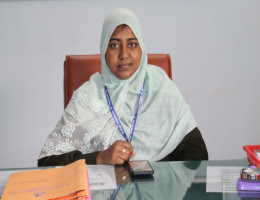
Department of Computer Science and Engineering
The Department of Computer Science and Engineering (CSE) was established in 2001 and offers a four-year B.Tech program in Computer Science and Engineering with an annual intake of 240 students. Additionally, the department provides a two-year M.Tech program in Computer Science Engineering, admitting 30 students annually. The department is committed to advancing theory, principles, and practice in computing to address the evolving demands of the digital age. Our focus is on the critical analysis, design, evaluation, and enhancement of computing systems, ensuring students are well-equipped for the ever-changing technological landscape. Our objective is to prepare students for successful careers in computer engineering and to enable them to pursue advanced studies in Computer Science at a global level. This mission aligns with the overarching vision of BALAJI INSTITUTE OF TECHNOLOGY & SCIENCE, reinforcing our commitment to academic excellence and industry relevance.
- To become competent for excellence in the stream of computer science and engineering to cater the needs of industry and society.
Vision

- To conduct programs in latest technologies to serve the needs of industry and society.
- To establish interaction with industry to meet growing technological advancements.
- To disseminate knowledge among students through effective teaching and learning process.
Mission



HOD Profile
Dr. Raziya Begum serves as an Associate Professor and the Head of the Department of Computer Science and Engineering at Balaji Institute of Technology and Science in Narsampet. With 16 years of experience in teaching and academia, she has built a strong foundation in educating and guiding students. She completed her Ph.D. at KLEF University, Vijayawada, with a focus on Artificial Intelligence and Machine Learning. Dr. Raziya Begum has contributed to the academic community through 10 published research papers in renowned international journals and conferences, alongside securing three patents and publishing two books. Certified in GATE, SET, and NET, she has a solid academic background. Her research interests span Machine Learning, Artificial Intelligence, and Data Science. As an educator, she is dedicated to mentoring students in emerging technologies and fostering innovation through research. In addition to her teaching, Dr. Raziya Begum actively partners with industry professionals and academic peers to bridge the gap between theoretical knowledge and practical applications.

Dr. Raziya Begum
HOD





Programs Outcomes
After completion of the Program, Graduates will be able to:
- Engineering knowledge: Apply the knowledge of mathematics, science, engineering fundamentals, and an engineering specialization to the solution of complex engineering problems.
- Problem analysis: Identify, formulate, review research literature, and analyze complex engineering problems reaching substantiated conclusions using first principles of mathematics, natural sciences, and engineering sciences.
- Design/development of solutions: Design solutions for complex engineering problems and design system components or processes that meet the specified needs with appropriate consideration for the public health and safety, and the cultural, societal, and environmental considerations.
- Conduct investigations of complex problems: Use research-based knowledge and research methods including design of experiments, analysis and interpretation of data, and synthesis of the information to provide valid conclusions.
- Modern tool usage: Create, select, and apply appropriate techniques, resources, and modern engineering and IT tools including prediction and modeling to complex engineering activities with an understanding of the limitations.
- The engineer and society: Apply reasoning informed by the contextual knowledge to assess societal, health, safety, legal and cultural issues, and the consequent responsibilities relevant to the professional engineering practice.
- Environment and sustainability: Understand the impact of the professional engineering solutions in societal and environmental contexts, and demonstrate the knowledge of, and need for sustainable development.
- Ethics: Apply ethical principles and commit to professional ethics and responsibilities and norms of the engineering practice.
- Individual and team work: Function effectively as an individual, and as a member or leader in diverse teams, and in multidisciplinary settings.
- Communication: Communicate effectively on complex engineering activities with the engineering community and with society at large, such as, being able to comprehend and write effective reports and design documentation, make effective presentations, and give and receive clear instructions.
- Project management and finance: Demonstrate knowledge and understanding of the engineering and management principles and apply these to one’s own work, as a member and leader in a team, to manage projects and in multidisciplinary environments.
- Life-long learning: Recognize the need for, and have the preparation and ability to engage in independent and life-long learning in the broadest context of technological change.











